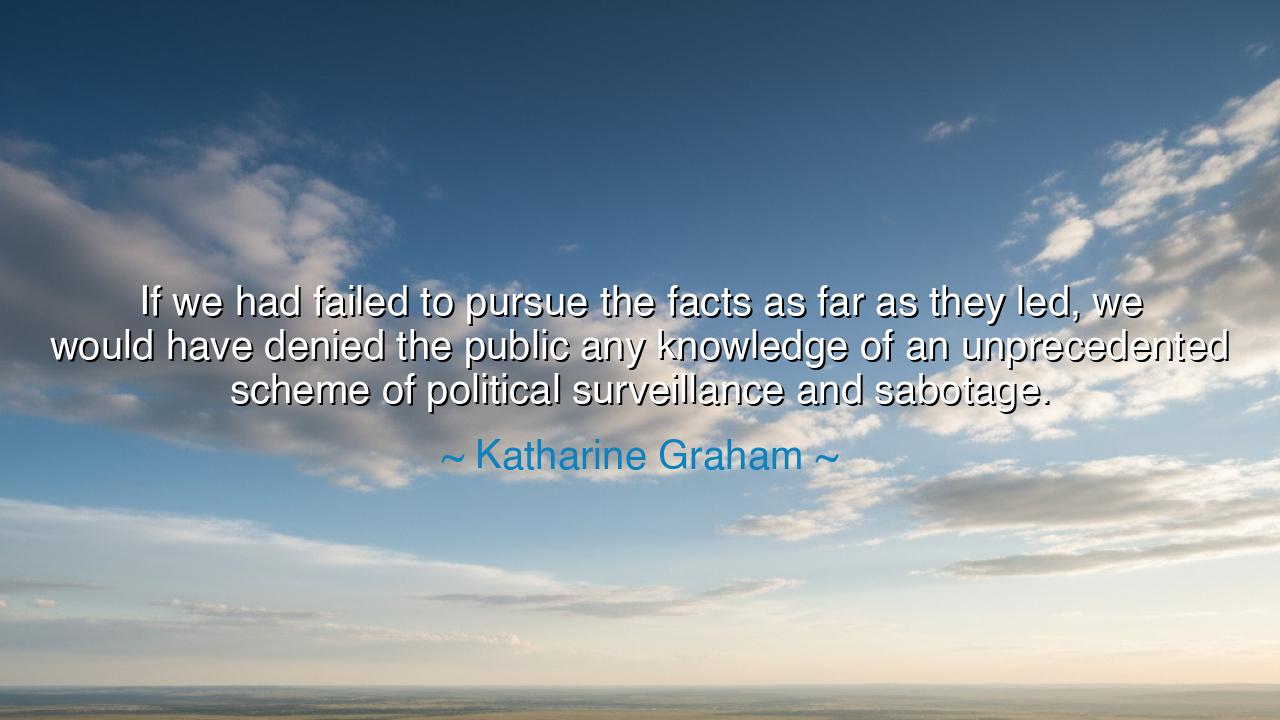
If we had failed to pursue the facts as far as they led, we would
If we had failed to pursue the facts as far as they led, we would have denied the public any knowledge of an unprecedented scheme of political surveillance and sabotage.






The words of Katharine Graham, publisher of The Washington Post and guardian of truth during one of America’s most perilous hours, stand as both a testimony and a warning: “If we had failed to pursue the facts as far as they led, we would have denied the public any knowledge of an unprecedented scheme of political surveillance and sabotage.” These are not the words of pride, but of solemn remembrance—spoken by one who bore the weight of conscience in an age when silence would have been betrayal. Her declaration is a hymn to courage, to integrity, and to the sacred duty of truth in the face of power.
The origin of this quote lies in the fires of the Watergate scandal, that dark chapter in American history when deceit crept into the halls of democracy. In the early 1970s, when the nation’s trust in its leaders was tested, it was The Washington Post, under the leadership of Graham and the fearless reporting of Bob Woodward and Carl Bernstein, that refused to turn away from the shadow. They pursued the facts—step by step, source by source—until the truth emerged: that corruption had reached the highest office in the land. Graham’s words, spoken after those years of turmoil, reflect the unyielding spirit that refused to let fear triumph over truth.
To “pursue the facts as far as they led” is not a small command. It is a moral pilgrimage, demanding patience, courage, and the willingness to suffer for what is right. Many in Graham’s time urged restraint, warned against challenging the powerful, and feared the ruin that might come from publishing what they had uncovered. But Graham understood that to deny the public knowledge of wrongdoing was to deny them the very foundation of self-governance. For democracy depends not on comfort, but on clarity; not on obedience, but on truth. To conceal corruption is to nourish it, and to reveal it is to cleanse the body politic.
Throughout history, the same law has held true: that truth must be pursued, even when it is dangerous. When Galileo Galilei looked upon the heavens and declared that the earth moved around the sun, he defied both church and empire. He was silenced, yet his courage became the torch of modern science. When Ida B. Wells exposed the brutal realities of lynching in America, she faced death threats, exile, and scorn. Yet her pursuit of fact shattered lies and opened the eyes of a nation. In every age, the pursuit of truth has demanded sacrifice—but it has also built the foundation of human progress.
Graham’s quote, though rooted in the struggle of journalism, speaks to all who would live honestly. Each person, in their own way, is a seeker of truth—whether in the small affairs of daily life or the great conflicts of history. To fail to pursue the facts is to live in shadow; to follow them wherever they lead is to walk in light. The courage she speaks of is not reserved for the few who write or speak publicly—it belongs to all who refuse to accept falsehood, who question what is hidden, who believe that no comfort is worth the cost of ignorance.
In her words lies also a call to vigilance. The “scheme of political surveillance and sabotage” that she revealed was not merely a scandal of one time, but a warning for all time. Power, unexamined, tends always toward corruption. Secrecy, unchecked, becomes a tool of control. Thus, the pursuit of truth is not an act of rebellion—it is an act of preservation. It defends the soul of nations and the dignity of individuals alike. As the ancients taught, the righteous do not fear the light; only those who hide in darkness do.
O listener, remember this lesson well: to know the truth is to be free, and to tell it is to make others free. Whatever path you walk—whether in the press, in the home, in the marketplace—let your eyes never turn from what is real. Seek the facts, even when they wound your comfort or shatter your illusions. Speak what you know, though the world resist you. For silence before falsehood is complicity, and the grace of truth is lost in concealment.
Thus, the wisdom of Katharine Graham endures like the flame of a watchtower: pursue the facts as far as they lead. Do not fear where they take you. For truth, though often buried beneath fear and deceit, is the only foundation upon which justice and freedom can stand. And when you find it—when you uncover that bright and terrible jewel of reality—hold it to the light, that all may see and remember that honesty, though costly, is the most sacred duty of the soul.






AAdministratorAdministrator
Welcome, honored guests. Please leave a comment, we will respond soon